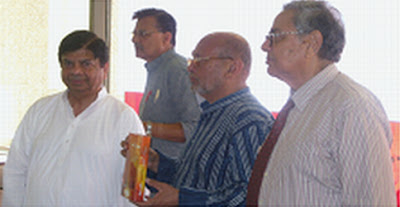By Zafar Iqbal,
“The future of Urdu and Hindi is tied together and both depend upon each other,” said Professor Asghar Wajahat at the third bi-lingual poetry recitation program held Sunday 16th August 2009 at the Montgomery County Executive Office Building in Rockville, Maryland. Professor Wajahat, a noted Hindi fiction writer and chairman of Hindi Department, Jamia Millia Islamia was presiding the bi-lingual “Yaum-e-Azadi” mushaira-kavi sammelan.
The program, initiated by the Washington Aligarh Alumni Association (AAA) in 2007 to celebrate the independence of the Indian Subcontinent, this year was joined by the Metropolitan Washington chapter of the Global Organization of the People of Indian Origin (GOPIO).

Mr. Tariq Farooqi, Drs. Zafar Iqbal, A. Abdullah, Rafat Husain, Asghar Wajahat, and Satyapal Anand
Wajahat, himself an Aligarh University alumnus, was pleased to see that AAA had started this program to bring speakers of Urdu and Hindi to a common platform. He further noted that the standard of literature coming out of Northern America was excellent.
Professor Satya Pal Anand, a stalwart academician, writer, and poet was impressed with the sentiments expressed about peace and friendship between communities by poets of both languages said “….. program has proved that we all are one; we may have differences but there are no ill-feelings amongst us.”
Similar sentiments were also expressed by other participants and audience during conversation with people. Mr. Fatehul Azam, a senior Aligarian visiting from Chicago, said, “Urdu and Hindi are like twin siblings that were surgically separated.” He added that the communities nurturing these siblings should keep on making efforts to let these siblings interact more often.
Wajahat also released a recently published book, Satya Pal Anand ki Nazm Nigari edited by Dr. A. Abdullah. This book is a compendium of articles written by prominent Urdu writers and critics about Dr. Anand and his contributions to the language.

Drs. Zafar Iqbal, A. Abdullah, Asghar Wajahat, and Satyapal Anand
Dr. Rafat Husain, AAA president welcomed the audience. He said that through this program we want to celebrate the common heritage of the subcontinent. Dr. Zafar Iqbal, General Secretary of GOPIO greeted the audience as its president Dr. Renuka Misra could not reach in time due to certain unavoidable circumstances. He thanked The Aligarh Alumni Association for giving GOPIO an opportunity to join hand in propagating a noble cause.
A. Abdullah, Akram Mahmood, Astha Naval, Aziz Quraishi, Baquer Zaidi, Dhananjaya Kumar, Gulshan Madhur, Madhu Maheshvari, Mohammad Anwar, Narendra Tandon Sahil Lakhnavi, Naseem Farogh, Razi Raziuddin, Rekha Maitra, Sadiq Bajwa, Satya Pal Anand, Suman Shukla, Suman Verdhan, Shakeel Azad, Sehba Ali, Tahira Rida, Vishakha Thakar, Yousuf Rahat, Zafar Syed, and Zaheer Parvez recited their inspiring poetic creations in front of a large audience in a spacious hall. The nizamat was conducted by Dr. A. Abdullah.
In his introductory remarks, Dr Abdullah recalled that 35 years ago The Association started the Mushaira tradition in the US. One of the goals of this activity was to provide a forum where people can assemble transcending political, religious, regional and geographical boundaries. He recalled that in 1975 after six month of active search he could find only 23 people in the entire North America who could be considered a poet. Today, 24 poets from our own city are participating at this event.
A colorful souvenir containing sample of poetry of participating poets, in both Urdu and Hindi scripts, and their short biography and photograph was also released at this occasion.
The Aligarh Alumni Association honored Dr. A. Abdullah with a plaque in recognition of his long and dedicated service for the promotion of Urdu language and literature.
Mr. Rajiv Ranjan, Counselor, Community Affairs, represented Embassy of India in Washington. He was impressed with the substance and message conveyed by the poets and stayed for the entire program.
Mr. Masood Farshori was the master of ceremony and the program was coordinated by Dr. Zafar Iqbal.

